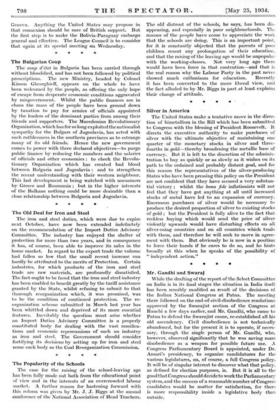Mr. Gandhi and Swaraj While the drafting of the report
of the Select Committee on India is in its final stages the situation in India itself has been sensibly modified as result • of the• decisions of the Indian National Congress at Patna. The meeting there followed on the end-of-civil-disobedience resolutions approved by the Swarajist section of the Congress at Ranchi a few days earlier, and Mr. Gandhi, who came to Patna to defend the Swarajist cause, re-established all his old ascendency. Civil disobedience is not technically abandoned, but for the present it is to operate, if neces- sary, through the single person of Mr. Gandhi, who, however, observed significantly that he was saving mass disobedience as a weapon for possible future use. A Congress Parliamentary Board is appointed, under Dr. Ansari's presidency, to organize candidatures for the various legislatures, on, of course, a full Congress policy: It will be of singular interest to discover what that policy, as defined for election purposes, is. But it is all to the good that Congress should decide to work the Parliamentary system, and the success of a reasonable number of Congress candidates would be matter for satisfaction, for there is more responsibility inside a legislative body than outside.
















































 Previous page
Previous page